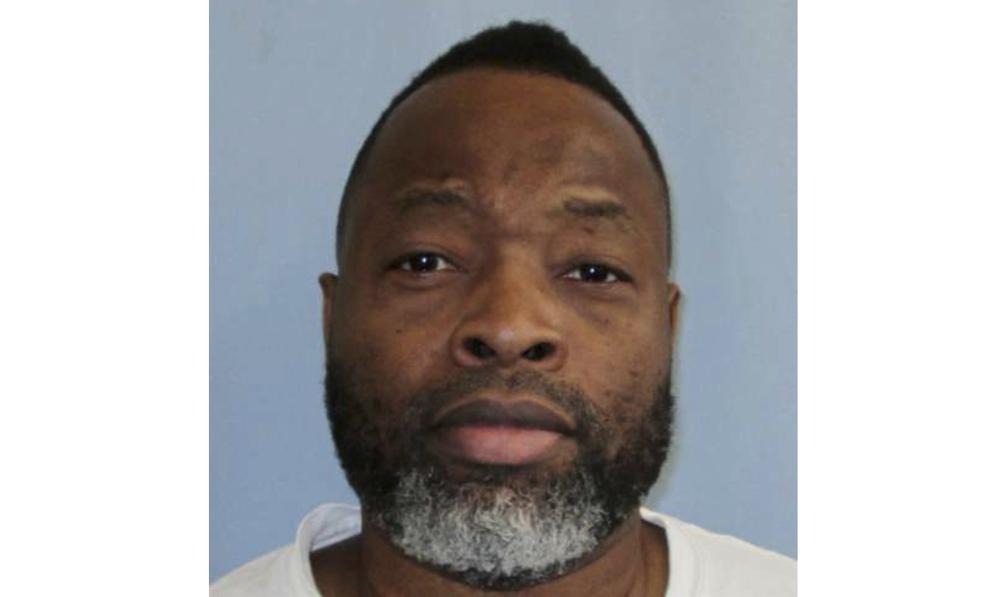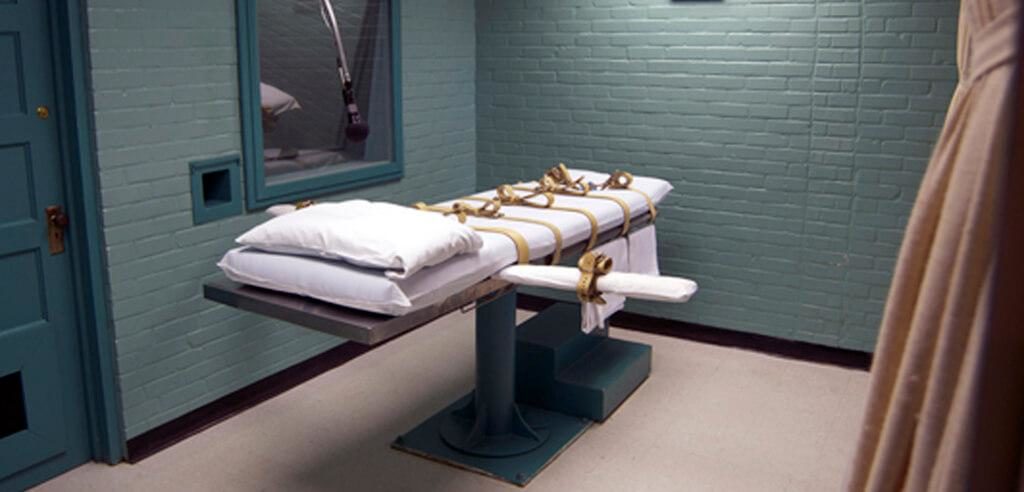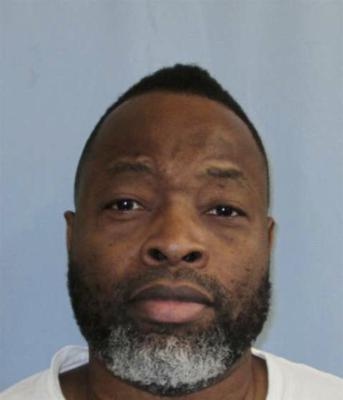Joe Nathan James Jr. executed despite calls from victim’s family to spare him

An Alabama inmate convicted of killing his former girlfriend decades ago was executed Thursday night despite pleas from the victim’s family to spare his life. Joe Nathan James Jr. received a lethal injection at a south Alabama prison after the U.S. Supreme Court denied his request for a stay. Officials said he was pronounced dead at 9:27 p.m. after the start of execution was delayed by nearly three hours. James, 50, was convicted and sentenced to death in the 1994 shooting death of Faith Hall, 26, in Birmingham. Hall’s daughters have said they would rather James serve life in prison, but Alabama Gov. Kay Ivey said Wednesday that she planned to let the execution proceed. Prosecutors said James briefly dated Hall and he became obsessed after she rejected him, stalking and harassing her for months before killing her. On Aug. 15, 1994, after Hall had been out shopping with a friend, James forced his way inside the friend’s apartment, pulled a gun from his waistband and shot Hall three times, according to court documents. Hall’s two daughters, who were 3 and 6 when their mother was killed, said they wanted James to serve life in prison instead of being executed. The family members not attend the execution. “Today is a tragic day for our family. We are having to relive the hurt that this caused us many years ago,” the statement issued through state Rep. Juandalynn Givan’s office read. Givan was a friend of Hall’s. “We hoped the state wouldn’t take a life simply because a life was taken and we have forgiven Mr. Joe Nathan James Jr. for his atrocities toward our family. … We pray that God allows us to find healing after today and that one day our criminal justice system will listen to the cries of families like ours even if it goes against what the state wishes,” the family’s statement read. Ivey said Thursday that she always deeply considers the feelings of the victim’s family and loved ones, but “must always fulfill our responsibility to the law, to public safety and to justice.” “Faith Hall, the victim of repetitive harassment, serious threats and ultimately, cold-blooded murder, was taken from this earth far too soon at the hands of Joe Nathan James, Jr. Now, after two convictions, a unanimous jury decision and nearly three decades on death row, Mr. James has been executed for capital murder, and justice has been served for Faith Hall. She said the execution sends an,” unmistakable message was sent that Alabama stands with victims of domestic violence.” The execution began a few minutes after 9 p.m. CDT following a nearly three hour delay. James did not open his eyes or show any deliberate movements at any point during the procedure. He did not speak when the warden asked if he had any final words. His breathing became labored, with deep pulsing breaths, and slowed until it was not visible. Alabama Corrections Commissioner John Hamm, responding to a question about why the execution was delayed, said the state is, ”very deliberate in our process in making sure everything goes according to plan.” He did not elaborate. Hamm also said James, who showed no movements at any point, was not sedated. The execution took place at a prison that houses the state’s death row. An inmate put signs in a cell window calling the execution a “murder.” A Jefferson County jury first convicted James of capital murder in 1996 and voted to recommend the death penalty, which a judge imposed. The conviction was overturned when a state appeals court ruled a judge had wrongly admitted some police reports into evidence. James was retried and again sentenced to death in 1999, when jurors rejected defense claims that he was under emotional duress at the time of the shooting. James acted as his own attorney in his bid to stop his execution, mailing handwritten lawsuits and appeal notices to the courts from death row. A lawyer filed the latest appeal with the U.S. Supreme Court on his behalf Wednesday. But the request for a stay was rejected about 30 minutes before the execution was set to begin. James asked justices for a stay, noting the opposition of Hall’s family and arguing that Alabama did not give inmates adequate notice of their right to select an alternate execution method. He also argued that Ivey’s refusal violates religious freedom laws because the Koran and the Bible “place the concept of forgiveness paramount in this situation.” The state argued that James waited too late to begin trying to postpone his execution and “should not be rewarded for his transparent attempt to game the system.” Republished with the permission of The Associated Press.
Steve Marshall issues statement after execution of Joe Nathan James, Jr.

Attorney General Steve Marshall issued a statement Thursday night after the execution of Joe Nathan James, Jr. The execution took place at the William C. Holman Correctional Facility in Atmore, Alabama. Marshall cleared the execution to commence at 9:04 p.m. James’ time of death was 9:27 p.m. James, 50, was convicted and sentenced to death in the 1994 shooting death of Faith Hall, 26, in Birmingham. Hall’s daughters, who were 3 and 6 at the time of the murder, have said they would rather James serve life in prison. Gov. Kay Ivey said Wednesday that she planned to let the execution proceed. James had been acting as his own attorney in a bid to stop the execution. However, a lawyer filed the latest appeal with the U.S. Supreme Court on Wednesday. The request for a stay was rejected about 30 minutes before the execution was set to begin. “Justice has been served,” Marshall stated. “Joe James was put to death for the heinous act he committed nearly three decades ago: the cold-blooded murder of an innocent young mother, Faith Hall.” “In the years since, Joe James has tried to blame everything and everyone in an attempt to escape the consequences of his crime. He has claimed that his highly experienced trial counsel was “ineffective,” that his artful appellate counsel was “deficient,” and — in a demonstration of shocking cowardice and callousness — that his victim bore the blame for her own murder,” Marshall continued. “Tonight, Joe James finally received his just punishment.” The family issued a statement through state Rep. Juandalynn Givan’s office. “Today is a tragic day for our family. We are having to relive the hurt that this caused us many years ago. We hoped the state wouldn’t take a life simply because a life was taken, and we have forgiven Mr. Joe Nathan James Jr. for his atrocities toward our family. … We pray that God allows us to find healing after today and that one day our criminal justice system will listen to the cries of families like ours even if it goes against what the state wishes,” the statement read.
Gov. Kay Ivey: Execution set despite wishes of victim’s family

Alabama’s governor said Wednesday that she has decided the state will proceed later this week with a plan to execute a man convicted of killing his former girlfriend decades ago, overriding a plea from the victim’s family to spare the man’s life. Gov. Kay Ivey told reporters she wouldn’t call off the scheduled lethal injection of Joe Nathan James Jr. at a south Alabama prison on Thursday evening. The inmate was convicted and sentenced to die for the 1994 shooting death of 26-year-old Faith Hall in Birmingham. Hall’s daughters, who were just 3 and 6 when their mother was killed, had urged along with Hall’s brother that officials change the sentence to life in prison without parole. But Alabama Attorney General Steve Marshall urged Ivey to let execution plans proceed and ensure “justice is done.” In making public her decision Wednesday morning, Ivey said, “My staff and I have researched all the records and all the facts, and there’s no reason to change the procedure or modify the outcome. The execution will go forward.” Prosecutors said James briefly dated Hall, but that he had become obsessed after she ended their relationship, stalking and harassing her for months before killing her. On Aug. 15, 1994, he forced his way inside an apartment, pulled a gun from his waistband, and shot her three times, they said. In the weeks leading up to the scheduled execution date, Hall’s daughters and brother had said they would rather James serve a life sentence in prison rather than be put to death. “I know it may sound crazy. Like, you really want this man to live? But … I just feel like we can’t play God. We can’t take a life. And it’s not going to bring my mom back,” Terryln Hall had told The Associated Press in a recent telephone interview. State Rep. Juandalynn Givan, who was a friend of Hall’s, sent a letter to the governor relaying the family’s request. “They are simply saying our wish as the family is for him to die in the penal system of the Alabama correctional facility. That’s how we want him to suffer, and we want to see that suffering for the rest of our lives,” Givan said Wednesday. Givan said the case was unusual in that the victim’s family had asked for clemency. Though James “brutally and senselessly killed” the mother of two simply because she rejected him, Givan said the family’s wishes should carry weight. “This is a tough one,” said Givan, who remembered Hall as a kind and devoted mother. “She was just the sweetest person you ever wanted to meet,” Givan said. Meanwhile, James has acted as his own attorney in a bid to halt Thursday’s execution procedure, filing handwritten lawsuits and requests for a stay. He has claimed his lawyers were ineffective and that prison officials did not explain what was at stake when it gave inmates a form in which they could select nitrogen hypoxia as their preferred execution method. Alabama has approved nitrogen hypoxia as an execution means but hasn’t developed a system for its use or scheduled any executions by that method. Republished with the permission of The Associated Press.
Daughters oppose upcoming execution of mother’s killer

Terryln Hall was just 6 years old when her mother, Faith, was fatally shot by a former boyfriend. Now, nearly 30 years later, Hall and her sister — along with their uncle — oppose Alabama’s plan to execute the man who killed their mother. Unless a judge or the governor intervenes, Joe Nathan James Jr., 49, will will die by lethal injection Thursday evening at a south Alabama prison. “We thought about it and prayed about it, and we found it in ourselves to forgive him for what he did. We really wish there was something that we could do to stop it,” Hall said in a telephone interview with The Associated Press. Faith Hall briefly dated James, but he became obsessed with her, prosecutors said. On Aug. 15, 1994, he forced his way inside an apartment, pulled a gun from his waistband and shot her three times. A Jefferson County jury convicted James of capital murder in 1996 and voted to recommend the death penalty, which a judge imposed. The conviction was overturned when the Alabama Court of Criminal Appeals ruled that a judge wrongly admitted some police reports into evidence. James was retried and again sentenced to death in 1999, when jurors rejected defense claims that he was under emotional duress at the time of the shooting. The 11th U.S. Circuit Court of Appeals denied James’ request for a stay of execution Tuesday. Faith Hall was 26 when she died, leaving behind two young daughters. Six-year-old Terryln Hall struggled to understand what had happened to her mother. “I knew that she wasn’t coming back, but I just never understood why. Why would he do that? That’s still a question that I want to know to this day: Why?” she said. Hall said her only real memory of her mother is as a hard worker who took care of her daughters and “whoever else was around.” “He took a big piece of us away, a big piece of our heart away,” she said. The road to forgiveness was a long process for Hall. “I did hate him. I did. And I know hate is such a strong feeling word, but I really did have hate in my heart. As I got older and realized, you can’t walk around with hate in your heart. You still got to live. And once I had kids of my own, you know, I can’t pass it down to my kids and have them walk around with hate in their hearts,” she said. State Rep. Juandalynn Givan sent a letter to Alabama Gov. Kay Ivey relaying the family’s request to stop the execution. “In this case, the Hall family, with deep prayer, consideration, and conviction, is asking you to have mercy by sparing the life of Mr. James,” Givan said in a statement. Alabama Attorney General Steve Marshall urged Ivey to let the execution proceed, despite the request from the victim’s family, writing that, “it is our obligation to ensure that justice is done for the people of Alabama.” The governor has not indicated what she plans to do. Ivey spokeswoman Gina Maiola wrote in an email that the governor “will carefully review all of the facts and information surrounding the case.” Hall realizes that asking the state to spare the life of the man who killed her mother may seem counterintuitive, but she’s compelled by deeply held beliefs. “I know it may sound crazy. Like, you really want this man to live? But … I just feel like we can’t play God. We can’t take a life. And it’s not going to bring my mom back,” she said. Republished with the permission of The Associated Press.
Alabama Supreme Court sets execution date for inmate

The Alabama Supreme Court has set an execution date of July 28 for a man convicted of killing his one-time girlfriend after breaking into her home in Jefferson County almost three decades ago, according to a court order made public Monday. Joe Nathan James Jr. would become the second Alabama inmate put to death this year unless a court intervenes. James, 49, was sentenced to die after being convicted of capital murder during a burglary in the killing of his one-time girlfriend, Faith Hall, in Birmingham. James, who had a history of stalking and harassing the woman, showed up at her apartment on Aug. 15, 1994, forced his way inside, and accused her of unfaithfulness, court documents show. James pulled a gun out of his waistband and shot the woman, who died of multiple gunshot wounds, and James was later arrested in California. A Jefferson County jury convicted James of capital murder in 1996 and voted to recommend the death penalty, which a judge imposed. The conviction was overturned when the Alabama Court of Criminal Appeals ruled that a judge wrongly admitted some police reports into evidence. James was retried and again sentenced to death in 1999, when jurors rejected defense claims that he was under emotional duress at the time of the shooting. Courts have since rejected appeals by James including claims that his lawyers were ineffective, and the state asked the court in March to set an execution date. James has never claimed to be innocent, the state argued, and he’s exhausted his appeals. In a hand-written appeal filed in federal court on his own behalf in April, James again claimed his lawyers were ineffective and said a judge wrongly admitted evidence and allowed prosecutors to ask improper questions. A judge hasn’t ruled on his petition, records show. While inmates can choose lethal injection or the electric chair, none has opted for electrocution. James’ execution would presumably be carried out by lethal injection since the state hasn’t said it is ready to conduct executions by an untried method called nitrogen hypoxia. Matthew Reeves was put to death in January by lethal injection in the state’s only execution so far this year. Republished with the permission of The Associated Press.


